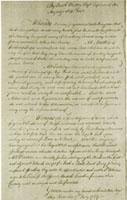
|
A Cautious Beginning: The Court of Civil Jurisdiction 1791 by Christopher English and Christopher Curran Palliser's Act, 1775: The Statutory Counter-Offensive For the liberal progressive school, the Act of 1775 is exasperating, the product of either wilful blindness or capitulation once again to a West Country lobby determined to deny Newfoundlanders their rightful destiny. Reeves, 16 years after the Act, reported that it was "submitted to with silent discontent". Prowse attributed it to Palliser's "one great fault - beyond his own circumscribed vision he could see no horizon; he had no faith, no hope, no future for the Colony, . . . his one idea that it remain a fishing colony and nursery for seamen".29 Assessed in its contemporary context in which English ministries were determined to ensure the primacy of imperial interests by means of an uncompromising enforcement of the Navigation Acts, the Act appears not entirely unsuited to the times. That it should stress the nursery for seamen in the aftermath of a war which had been fought by 1763 in Europe, North America, the Caribbean and India, and on the eve of another which would pit England against the Thirteen Colonies and France in 1776 was understandable. The emphasis on a migratory fishery was the restatement of a historic English policy of at least a century's standing.
If it failed to recognize by statute the changes which were transforming the fishery to an indigenous one, it is also clear that that process was not yet accomplished and that the local population was neither permanent nor large enough, at perhaps 15,000, to sustain it. If the Act was a disappointment to the local inhabitants, which is not at all apparent, the disappointment was one tempered by a recognition that imperial interests, as ever, were bound to predominate. With the statutory regime confined to regulating the Newfoundland fishery within a framework of imperial interests, the administration of justice among a growing, however impermanent, year-round population fell to the Governor acting under his instructions issued via prerogative writ. Courts of Session in 1729, Oyer and Terminer in 1750, customs officers and a Court of Vice-Admiralty by the 1770's, contributed to the functioning of an informal, customary legal regime which reflected local realities and needs. To the extent that they were sanctioned under the Governor's powers issued under the Great Seal, or by instructions "bearing the signet and sign-manual of the King" they were legal as long as they did not infringe upon the jurisdiction of the fishing admirals mandated by statute. Research on with what success the indigenous, pragmatic and informal system of legal institutions which had emerged during the 18th century functioned, and on the ideology which underpinned it, is in its earliest stages. But there is enough to provide glimpses of how some contemporary English norms had been adapted to local circumstances. As was the case in contemporary England and France, most crimes appear to have been committed against the person. For the most part the formal judicial system was concerned with crimes, reflected in the wide net cast to make them capital ones, against property. Property was sacred because so many people had so little. The loss of a cow or a few chickens, sources of milk or eggs to be sold in a local market, or of a hut by fire was often enough in 18th century France to push a small farmer or agricultural labourer over the line into permanent indigence. In 1754 four drunks were indicted before the court of Oyer and Terminer in St. John's for killing a cow. A fifth was accused of receiving the butchered meat. All were sentenced to hang, though two were recommended to the Governor's mercy. Their eventual fate is not noted. In 1792 six men were publicly whipped destroying sea birds for their feathers and for crushing their eggs,30 presumably because to do so was to deny the community a supplementary source of food. For stealing a piece of pork valued at one shilling, and two of ham valued at two pence, William Petcain at Placentia in 1791 received 36 lashes on his bare back and he and his family were deported. 31 |
||||||||||||||||
 |
||||||||||||||||
